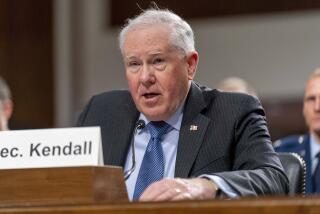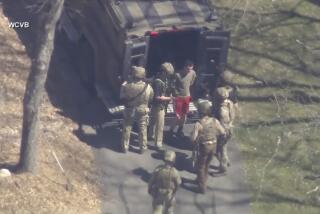Ex-Soldier Refusing to Cooperate in Spy Probe
- Share via
BONN — A former U.S. serviceman arrested this week on suspicion of spying for the Communist East Bloc is refusing to cooperate with West German authorities, complicating U.S. and NATO efforts to assess the intelligence losses caused by the spy ring he allegedly led, German officials said Friday.
Retired Army Sgt. First Class Clyde Lee Conrad, 41, of Sebring, Ohio, was seized Tuesday at his home in Germany after a long investigation by U.S., West German and Swedish agents.
But Alexander Prechtel, spokesman for the federal public prosecutor’s office in Karlsruhe, West Germany, declared: “Conrad is not helping us. He is refusing to say anything. So we’ll have to do it the slow way. Our first task is to establish exactly what secret documents he had access to. That is going to take some time.”
Cleared in 1978
In Washington, Army officials said Conrad was granted a “top secret” clearance in 1978 after a background check by the Defense Investigative Service and the Army’s Intelligence and Security Command. He held the clearance until he retired in September, 1985, after 20 years of service, according to Army spokesman Lt. Col. Greg Rixon.
Conrad’s top-secret clearance allowed him access to much of the Army’s most sensitive information in his capacity as an archives clerk at the headquarters of the U.S. 8th Infantry Division at Bad Kreuznach, southwest of Mainz, West Germany.
Army officials acknowledged that Conrad’s clearance was not reviewed periodically, as required by U.S. military regulations, because of a large backlog in security checks. Rixon said that the Pentagon fell behind in normal five-year security reviews in the late 1970s and early 1980s.
German and U.S. investigators said he passed top secret information on defense plans of American and North Atlantic Treaty Organization forces to the Hungarian intelligence service through Swedish-national couriers of Hungarian descent. In addition, he is suspected of providing microfilmed data on NATO missile sites, weapons storage dumps and fuel pipelines to his Hungarian spymasters.
The Hungarians presumably passed the information along to the Soviet KGB in Moscow.
Wide Access to Secrets
Spokesman Prechtel said that Conrad, in his administrative capacity, would have had wide access to extremely sensitive Western military plans, including defensive deployments in the event of a Warsaw Pact attack on Western Europe.
The former sergeant recruited at least one U.S. serviceman to spy for him, Prechtel said, by offering “five-figure” cash payments. Prechtel did not elaborate on the charge.
U.S. officials declined to comment on the allegation that one or more other U.S. soldiers may have been involved in the espionage ring, referring all questions to German authorities.
The former serviceman was said to have been paid considerable amounts of money by the Hungarian intelligence service, and his most recent contact with them was during a trip to Vienna in July. At the Vienna meeting, secretly observed by Western counterintelligence agents, Conrad allegedly exchanged classified data for money.
The sensationalist West German newspaper Bild, which has close connections to the German intelligence authorities, said that Conrad had received more than $1 million in payments from the East Europeans.
‘Extremely Important Secrets’
“He must have betrayed extremely important secrets,” the paper quoted an intelligence official as saying.
Meanwhile, in Stockholm, a Swedish prosector said two doctors who immigrated from Hungary admitted their role in spying and acting as couriers for Hungarian intelligence services.
“They have admitted they were recruited by Hungary as agents and worked against NATO,” prosecutor Sven Olof Hakansson told Swedish television.
Security officials said Sandor Kercsik, 48, and Imre Kercsik, 34, were suspected of “preparing unlawful intelligence activity and supporting preparations of criminal acts.”
The wife of one of the doctors also was being questioned in the case but has not been charged, Hakansson said.
“We also have technical evidence in the form of spy equipment found in their homes,” he said.
The network reportedly used classic spy equipment in their espionage efforts, including short-wave radios, coding gear and clandestine drop boxes.
Four more members of the ring are reportedly detained elsewhere in Europe, although no authorities have definitely confirmed this nor indicated where they were being held.
West German authorities said Friday that there were no plans to extradite Conrad to the United States, nor had any such request been made by the American government.
Ordinarily, the former sergeant would be tried under West German laws and subject to penalties of 10 years’ to life imprisonment if found guilty of charges that could range from espionage to treason.
U.S. Atty. Gen. Richard L. Thornburgh on Friday said it is unlikely that the Justice Department would seek charges against Conrad. Under international law, espionage is considered a politically motivated crime not subject to extradition, Justice Department officials said.
In an interview with the Reuters news agency, Thornburgh said, “Obviously, any breach of security in an intelligence operation of this type is serious.” But he declined to spell out the evidence against Conrad or to speculate on the severity of the damage to U.S. security caused by the alleged sale of secret documents to the East Bloc.
Conrad, who served as an infantryman in Vietnam in 1966-67, had an exemplary record and had been awarded medals for good conduct and meritorious service. He was granted an honorable discharge when he retired in 1985.
He was married to a German woman, and neighbors said they lived quietly in a modest house near Kaiserslautern, a German town surrounded by large American military bases.
Interviewed by German television, regulars in the local beer hall said the American was “always friendly.”
“If he was paid as well as they say for his spying,” said one regular, “he certainly didn’t throw his money around. There was nothing flashy about him.”
In telephone interviews Friday, friends, teachers and classmates in Conrad’s hometown said he was a reserved, socially awkward young man but was generally liked by all who knew him.
“He was pretty much a loner,” said Sheryl Egli, a classmate of Conrad’s at Sebring-McKinley High School in Sebring, Ohio. “He never really caused any trouble at all.”
Acquaintances painted a picture of a young man determined to escape his family’s meager income and achieve the success that had eluded him in his youth by joining the military as soon as he graduated from high school in 1965.
“Like all of us who grew up in a small town, he experienced a desire to find something better, and he did that through the Army,” said Roger Wayt, one of several classmates who also joined the military after graduation.
Acquaintances said they very rarely heard what Conrad was doing and last saw him when he attended his 20th high school reunion in 1985. That visit and town gossip about Conrad’s life in Germany indicated that he was becoming wealthy and was more content than ever, they said.
At the reunion, “he seemed very happy because he had just retired and was settling down in Germany,” Egli said.
Claude Andrews, a friend of Conrad’s father, said word had gotten around the close-knit town of 5,000 that Conrad was doing so well that he had bought a new home in Sebring for his parents and bought a new home for himself in Germany every time he moved.
“People were saying he was pretty wealthy,” Andrews said. “Our neighbors say (that) when he’d move around over there in Germany, instead of staying in a hotel, he’d buy himself a new home.”
Son of Factory Worker
The son of a factory worker, Conrad was born Aug. 28, 1947, in Bergholz, Ohio, according to Jefferson County, Ohio, records.
Early in his childhood, he moved with his parents about 50 miles north to Sebring, a rural, blue-collar town of about 5,000. Several classmates said they remember the Conrads as being a relatively poor family.
A woman reached at the home of Conrad’s parents would not comment on the spying matter, and his sister, living in nearby Alliance, Ohio, could not be reached for comment. Both of Conrad’s parents are still alive, town residents said.
In school, Conrad was an “average” student, several classmates and teachers said. “He was not so quiet that he didn’t participate at all in class, but he certainly wasn’t outspoken,” said Lucille Patterson, a retired math teacher who said she taught Conrad at least one year.
But in general, acquaintances said, Conrad was not an active member of his class and did not excel at anything in particular. “He didn’t stand out in any way,” Wayt said.
William Tuohy reported from Bonn and John M. Broder from Los Angeles. Times staff writer Mark Lawrence contributed to this story from Washington.
More to Read
Sign up for Essential California
The most important California stories and recommendations in your inbox every morning.
You may occasionally receive promotional content from the Los Angeles Times.










